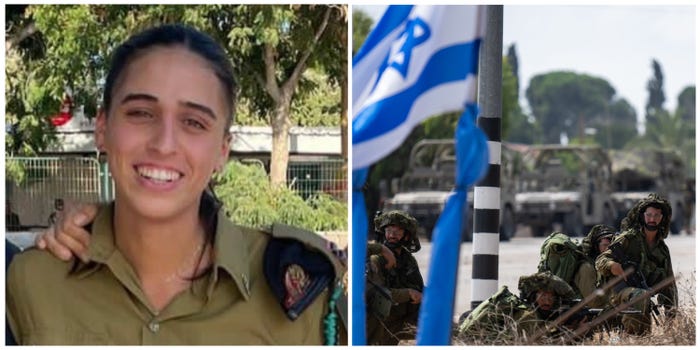Former IDF Women Soldiers Campaign For Gaza Prisoner Release

Table of Contents
The Campaign's Core Demands and Objectives
The campaign for Gaza prisoner release centers on securing the freedom of Palestinian prisoners held in Israeli jails. Their demands aren't uniform, focusing instead on specific categories of prisoners based on their circumstances and length of imprisonment. This targeted approach aims to highlight the humanitarian concerns involved in long-term detention.
- Release of elderly prisoners: The campaign prioritizes the release of aging prisoners, emphasizing their declining health and the ethical implications of continued confinement.
- Release of sick prisoners: Many prisoners suffer from serious illnesses requiring specialized care unavailable within the prison system. The campaign advocates for their release on compassionate grounds.
- Release of prisoners with long sentences: The campaign highlights cases of individuals serving exceptionally long sentences, arguing that the length of imprisonment outweighs the severity of their alleged offenses.
- Review of cases for possible release on humanitarian grounds: A key objective is to initiate a thorough review of all cases, seeking potential releases based on humanitarian considerations.
Beyond the immediate goal of Gaza prisoner release, the campaign aims to foster dialogue between Israelis and Palestinians, shedding light on the human cost of the conflict and promoting a broader discussion about human rights within the context of the Israeli-Palestinian conflict. This includes advocating for improved conditions for all Palestinian prisoners.
The Role of Former IDF Women Soldiers
The involvement of former IDF women soldiers is a defining feature of this campaign. These women, having served on the front lines, bring a unique perspective and credibility to the conversation surrounding Gaza prisoner release. Their firsthand experience with the conflict allows them to speak with authority, bridging the gap between military realities and humanitarian concerns.
- First-hand experience with the conflict: Their experience provides a nuanced understanding of the complexities and sensitivities surrounding the issue.
- Credibility among both Israeli and international audiences: Their military background lends weight to their arguments, resonating with both Israeli and international audiences.
- Potential to bridge divides and foster understanding: Their participation helps to build trust and foster understanding between conflicting sides, encouraging empathy and compromise.
The involvement of IDF women in this activism underscores the growing power of women's activism within Israel and its potential to shape the political landscape. These veterans are not merely advocating for Palestinian prisoners; they're reshaping the narrative of the Israeli-Palestinian conflict through their unique lens and impactful advocacy.
Public Response and International Attention
The campaign for Gaza prisoner release has garnered considerable attention, eliciting a mix of support and criticism. The response highlights the deeply divisive nature of the Israeli-Palestinian conflict.
- Supportive statements from human rights organizations: Several international human rights organizations have voiced their support, citing concerns about prisoner treatment and the need for humanitarian intervention.
- Criticism from Israeli government officials or right-wing groups: The Israeli government and right-wing groups have expressed strong opposition, citing security concerns and the perceived dangers of releasing prisoners.
- Coverage by international media outlets: The campaign has drawn significant media attention, both within Israel and internationally, raising awareness about the issue and fueling ongoing debates.
The campaign's impact on public opinion remains complex and contested. While some are swayed by the humanitarian appeal, others remain skeptical, highlighting the deeply entrenched divisions within Israeli society and the international community regarding the Israeli-Palestinian conflict. The media coverage, however, has undoubtedly amplified the conversation around Gaza prisoner release and its humanitarian implications, pushing the issue further into the international spotlight.
Legal and Political Ramifications
The release of Palestinian prisoners presents significant legal and political challenges. The Israeli government must weigh various factors to make informed decisions, considering both domestic and international implications.
- Security concerns and potential risks of prisoner release: A primary concern is the potential risk to Israeli security, with fears that released prisoners might re-engage in hostile activities.
- International law regarding prisoner treatment and release: International law plays a significant role, setting standards for prisoner treatment and outlining the conditions under which release might be justified.
- Political repercussions for the Israeli government: Any decision regarding Gaza prisoner release carries substantial political weight, impacting relations with both the Palestinian Authority and international bodies.
Finding a solution requires navigating complex legal frameworks and responding to the political realities of the situation. Potential compromises could involve phased releases, strict monitoring, or prisoner exchanges as part of a broader peace process. Addressing these security concerns and legal considerations is vital in finding a path towards a just and sustainable solution.
Conclusion
The campaign by former IDF women soldiers for Gaza prisoner release highlights the urgent humanitarian need for a review of prisoner cases, focusing on those who are elderly, sick, or have served excessively long sentences. Their unique perspective has brought renewed attention to the human cost of the Israeli-Palestinian conflict and sparked debate within Israel and internationally. The campaign faces significant legal and political obstacles, including security concerns and potential political repercussions. However, it underscores the critical need for ongoing dialogue, peaceful solutions, and the protection of human rights in the pursuit of lasting peace.
To learn more about this critical campaign and advocate for Gaza prisoner rights, consider signing petitions, contacting your representatives, or donating to organizations working towards prisoner release and peace in the region. By engaging in informed discussions and taking action, we can collectively strive for a just and equitable resolution to the Israeli-Palestinian conflict and support the pursuit of Palestinian prisoner release. The fight for Gaza prisoner rights is a fight for human rights and a crucial step towards lasting peace in the region.

Featured Posts
-
 Fcm Legende Lars Fuchs Dankbarkeit Fuer Den Bundesliga Traum
May 26, 2025
Fcm Legende Lars Fuchs Dankbarkeit Fuer Den Bundesliga Traum
May 26, 2025 -
 How Canada Posts Problems Are Creating Opportunities For Rivals
May 26, 2025
How Canada Posts Problems Are Creating Opportunities For Rivals
May 26, 2025 -
 The Painful Truth About Buy And Hold Is The Long Game Really The Only Way
May 26, 2025
The Painful Truth About Buy And Hold Is The Long Game Really The Only Way
May 26, 2025 -
 Doert Yildiz Oyuncu Icin Real Madrid De Sorusturma Baslatildi
May 26, 2025
Doert Yildiz Oyuncu Icin Real Madrid De Sorusturma Baslatildi
May 26, 2025 -
 Flood Alerts Explained Your Essential Guide To Flood Safety
May 26, 2025
Flood Alerts Explained Your Essential Guide To Flood Safety
May 26, 2025
